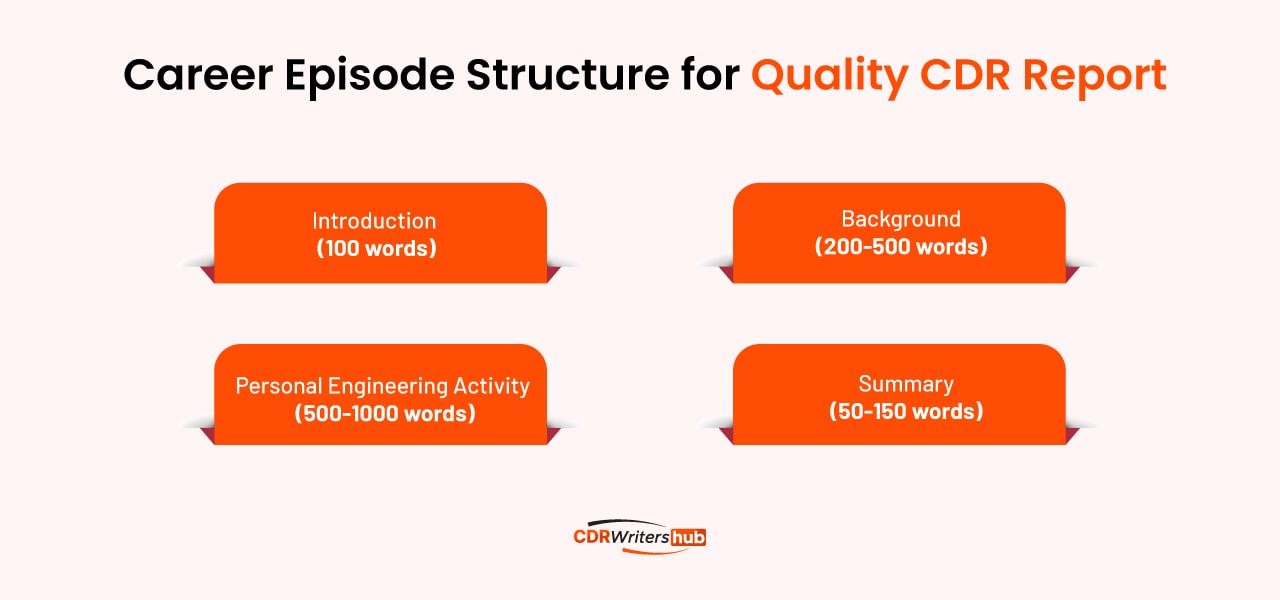Exceptional Tips from our Professional for writing Career Episode

Exceptional Tips from our Professional for writing Career Episode
Career Episode is one of the important sections of the Competency Demonstration Report (CDR). Our professionals have summed career episode writing in the most simple way for applicants to understand. MSA booklet considers career episodes as an important component as this is where your engineering skills are highlighted.
A career episode shows the engineer’s most notable academic accomplishments and work experience. When writing a career episode, the applicant must focus on the three distinct career episodes for three different projects that an engineer has worked on. This must be part of the applicant’s professional experience. The career episode will tell the assessor of your CDR about your technical knowledge and abilities gained during your studies and profession as an engineer. This will aid them in selecting you for the position you deserve.
Major Significance of Career Episode
Table of Contents
The career episode is crucial for demonstrating your specialized field’s knowledge, capabilities, and accomplishments. The career episode report details various aspects of your employment and engineering skills. You might compose your career episodes for university projects you did during your time of study or for projects you had in your professional working environment for some organization. CDR Report will require you to write three career episodes that involve the same strategies in all instances. Following are the important points you must remember during your career episode writing.
Each career episode focuses on a single time period or component of your engineering activities. Each career episode must focus on your engineering activities’ different time or topic. Each episode should highlight how you utilized your engineering knowledge and abilities in the specified occupation. Career Episodes based on work experience must be backed by proof of employment. These should be uploaded to your online application’s “Employment” part.
- Focus on your role played in the project rather than your team members.
- Write in detail about the flaws you encountered while accomplishing the duties assigned to you, as well as how you overcame them.
- Application of your expertise and how it aided you in achieving your objectives.
- Some of the technical challenges you overcome.
- Ideas and tactics you devised that had a major influence on the outcome of the specified work.
Why Do You Need Career Episodes?
Engineers with engineering degrees from universities other than Australia must demonstrate their abilities to Engineers Australia (EA). They want to guarantee that skilled individuals they have let in can work in Australia and do not pose a risk to the economy.
EA introduced a skills evaluation of engineers where Engineers wishing to migrate to Australia need to compose a competency demonstration report (CDR). The CDR consists of three career episodes demonstrating your expertise and knowledge from your last year of engineering, internships, or equivalent program.
During this stage of the candidate’s career, EA may assess the candidate’s engineering abilities. As a result, if someone wants to guarantee that their migration to Australia is judged favorably by EA, a well-planned career episode is a must.
Basic Format for a Professional Career Episode

CDRs adhere to a certain structure that provides the applicants with a full summary of their professional experiences at a glance. It entails the following elements:
You must write three separate Career Episodes for your CDR Report. Career episodes should be written in an essay format rather than a table form. Each Career Episode has four sections: introduction, background, personal engineering activity, and summary. What exactly should you include in this section? Let’s see how things proceed.
Introduction (100 words)
This is the first section of the Career Episode. The word count of this section should be approximately 100 words. Here you need to write about
- The goal and scope of a project on which you are working in chronological order.
- Career Episode Dates and Duration (the exact date of the beginning as well as the ending of the episode).
- Name of the educational institution/organization where you obtained the experience.
- The geographical location of your project (city, state, or nation) where you acquired the experience.
- Title of the role you hold at that specific institution/organization.
Background (200-500 words)
The next section of the Career episode is written in about 200-500 words. This section establishes the environment and creates a context for your studies/work. It should contain items such as:
- the fundamental essence of the engineering project.
- the aims of the project
- the nature of your specific work area.
- an organizational chart displaying your place regarding the career episode.
- a statement of your responsibilities (give an official duty statement if one is available).
Personal Engineering Activity (500-1000 words)
This is the main body part of the applicant’s project history and the major components. Applicants describe in detail the actual work performed by you. You should explain what you did and how you accomplished it. It is not enough to outline the operations of a team or group; your job must be clearly defined. Remember that your engineering talents are being evaluated. This section should include the following items:
- How you enrolled your engineering knowledge and skills;
- The tasks delegated to you and how you completed them;
- Any particular technical difficulties/problems you encountered and how you solved them;
- Strategies devised by you, including any original or creative design work;
- How you collaborated with other team members.
Summary (50-150 words)
This section summarizes your thoughts on the engineering activity and your participation. It should contain things like:
- Your perspective on the overall project;
- How the project performed in terms of reaching the goals/requirements;
- How your specific role contributed to the project.
Writing a Career Episode is a skill, and it should be carefully crafted in a way that communicates all about you. It should focus on your accomplishments rather than collaborations and how you contributed to the project’s success. It would be beneficial to prepare the CDR with care and attention to detail. Our professionals can give you efficient online services if you want writing assistance.
9 Tips for Getting a Good Career Episode
- Your career episode projects should be focused on your specific ANZSCO occupation. Each episode’s project should be unique and represent your abilities and strategies for tackling the issues presented to you. It might be one of your academic or professional year initiatives in which you played a key part.
- The word count for the career episode is 1500-2500. Ensure you stay to the limit and avoid excessive graphs, illustrations, and explanations.
- An EA assessor assesses your report. Excessive terms, technical language, and jargon are not required since they may cause your report to be delayed or rejected.
- Only Australian English should be used for writing career episodes.
- In addition to using active voice, most of the first-person narrative, i.e., “I,” must be used throughout the episode.
- It is recommended that you adopt the format for authoring career episodes. Unnecessary tables and computations should be avoided. A description of the operations is required instead of particular technical facts.
- Instead of focusing on your team members, you should concentrate on your own contribution to the project. Write more about your difficulties and the methods you used to complete the job.
- Follow EA’s proper guidelines for career episode writing
- Include the right number for each paragraph in the career episode for easy reference in the Summary Statement.
- The initial paragraph of Career Episode 1 will be numbered 1.1, 1.2, and 1.3. The paragraphs in Career Episode 2 will be numbered 2.1, 2.2, and 2.3.
- The number of career episode paragraphs mentioned must be specified in the summary statement.
Why choose CDRWritersHub?
If you have any queries related to CDR reports or CDR samples on many engineering occupations, contact us, and we will introduce you to our best consultant to assist you. CDRWritersHub is an Australian-registered consultant specializing in RPL report writing, KA02, and CDR report reviewing.
Frequently Asked Questions
What is a Career Episode?
A Career Episode is a report that shows the engineer’s most notable academic accomplishments and work experience. Career Episodes will tell about your technical knowledge and abilities gained during your studies and profession as an engineer. This will aid them in selecting you for the position you deserve.
How many career episodes do you have to write for Engineers Australia?
You have to write 3 career episodes that describe engineering experiences that you believe contributed to your development and demonstration of Stage 1 competency. It is important that you read the competency standards for the occupational category you are interested in before starting.



